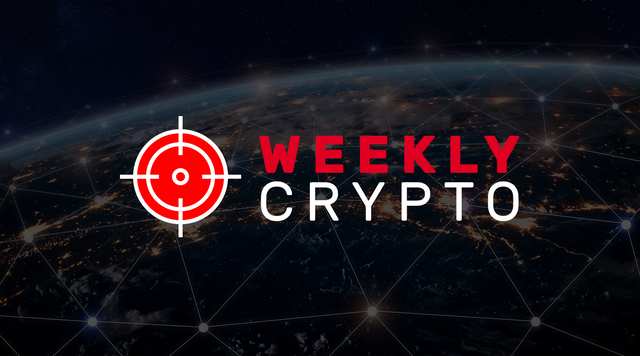Weekly Crypto #11
Stay ahead of the game with weekly industry updates, aimed to capture all important crypto and blockchain news of the week.
Could governments be powered by blockchain? Dubai thinks so, as does IBM. Stablecoin by Circle launched, following Winklevoss stablecoin. ShapeShift shifts core privacy views and upsets crypto community. WEF is optimistic about the next 10 years of global economy, Walmart is betting on the blockchain to improve food safety, Porsche will increase investments in blockchain and AI startups, and Google partly ends cryptocurrency ad ban.

Regulations & Finance
Over 75 New Banks: JPMorgan Expands Blockchain Payments Trial: JPMorgan, Australia’s ANZ and the Royal Bank of Canada launched a blockchain payments trial and gained over 75 banks as participants. From the beginning of the project in 2017, their aim was to “to slash both the time and costs required for interbank payments using traditional methods”.
IBM CTO Tells US Congressmen ‘Let’s Get Government Ready for Blockchain’: Stressing the importance of creating the best legal framework for innovation and blockchain implementation, IBM and members of the U.S. Congressional Blockchain Caucus discussed the use of blockchain. IBM also published a report The Impact of Blockchain for Government: Insights on Identity, Payments, and Supply Chain.
Swiss Bankers Act to Correct Anti-Crypto Bias: The Swiss Bankers Association (SBA) released a new set of guidelines to banks to create a more cooperative environment in view of many banks’ reluctance to do business in the crypto sector. Adrian Schatzmann, strategic adviser of the SBA, stated: “We believe that with these guidelines, we’ll be able to establish a basis for discussion between banks and innovative startups, making the dialogue simpler and facilitating the opening of accounts.”
Dubai is building a blockchain powered government: Online payment portal DubaiPay will use blockchain technology for real-time reconciliation and settlement of transactions. Mira Sultan Obaid Abdul Rahman explained: There is no real-time monitoring of the transaction in the old system and with blockchain, the whole process can be monitored in real time.
Circle Internet Financial Launches Stablecoin ‘USD Coin’: Circle CEO Jeremy Allaire pointed out that USDC will be “a huge difference” from Tether — a well-known and reportedly controversial stablecoin: “Market infrastructure like stablecoins will become the base layer that supports every financial application. It has to be legitimate, trustworthy, built on open standards."
Regulators Land Punches, But There’s a Long Fight Over Crypto Ahead: ShapeShift introduced a new membership model with mandatory account identification, the action not so well received by crypto community. ShapeShift described the move as a “way to provide added perks to loyal customers and to explore approaches to tokenizing that loyalty.”

Blockchain can measure electricity production at the level of the wind or solar farm, certify it, and make it tamper-proof. And the same information can also be used for trading. RecondOil / Flickr
Industry & Technology
WEF — Blockchain Could Improve Multiple Spheres of Global Economy: The World Economic Forum (WEF) released an optimistic outlook for the global economy, which would be driven by the impact and adoption of blockchain technology in the next 10 years. A report Trade Tech — A New Age for Trade and Supply Chain Finance claims distributed ledger technology (DLT) such as blockchain could generate $1 trillion in new trade over the next ten years.
This German Fintech Startup Will Let You Hold Bitcoin in Your Bank Account: Bitwala is set to launch first platform that will enable the management of both euro deposits and bitcoin funds within the same account.
Walmart is betting on the blockchain to improve food safety: Walmart has been working with IBM on using the blockchain to digitize the food supply chain process. Before moving the process to the blockchain, it typically took approximately 7 days to trace the source of food. With the blockchain, it’s been reduced to 2.2 seconds. That substantially reduces the likelihood that infected food will reach the consumer.
Porsche Increases Investments in New Technologies With Focus on Blockchain and AI Startups: Prompted by the need to “gain access to trends, new technologies and business models,” German automobile manufacturer Porsche AG will increase its investments in blockchain and AI startups — by around $176 million over the next five years.
Google ends cryptocurrency ad ban — but only for certain kinds of ads: In March, Google announced restrictions to buy ads, originally to protect consumers, including ICO projects, wallets and trading advice. Those ads are still not allowed. The updated policy will allow regulated crypto exchanges to buy ads in the US and Japan.
Energy Web Foundation: Blockchain essential for EV growth, community solar. Distributed energy solutions such as solar PV, batteries, and smart controls are getting cheaper by the day and will soon outperform traditional energy sources such as coal, gas, and nuclear power. Blockchain-type solutions will be needed for the mass deployment of electric vehicles, states Hervé Touati, CEO of the Energy Web Foundation (EWF), in an interview with Euractiv.
Are you interested into regulatory aspects of blockchain and crypto industry? Check our latest CRYPTO LEGAL DIGEST to stay ahead!
Follow our updates on LinkedIn and Twitter. For regular blog updates follow Netis Group Medium publication.